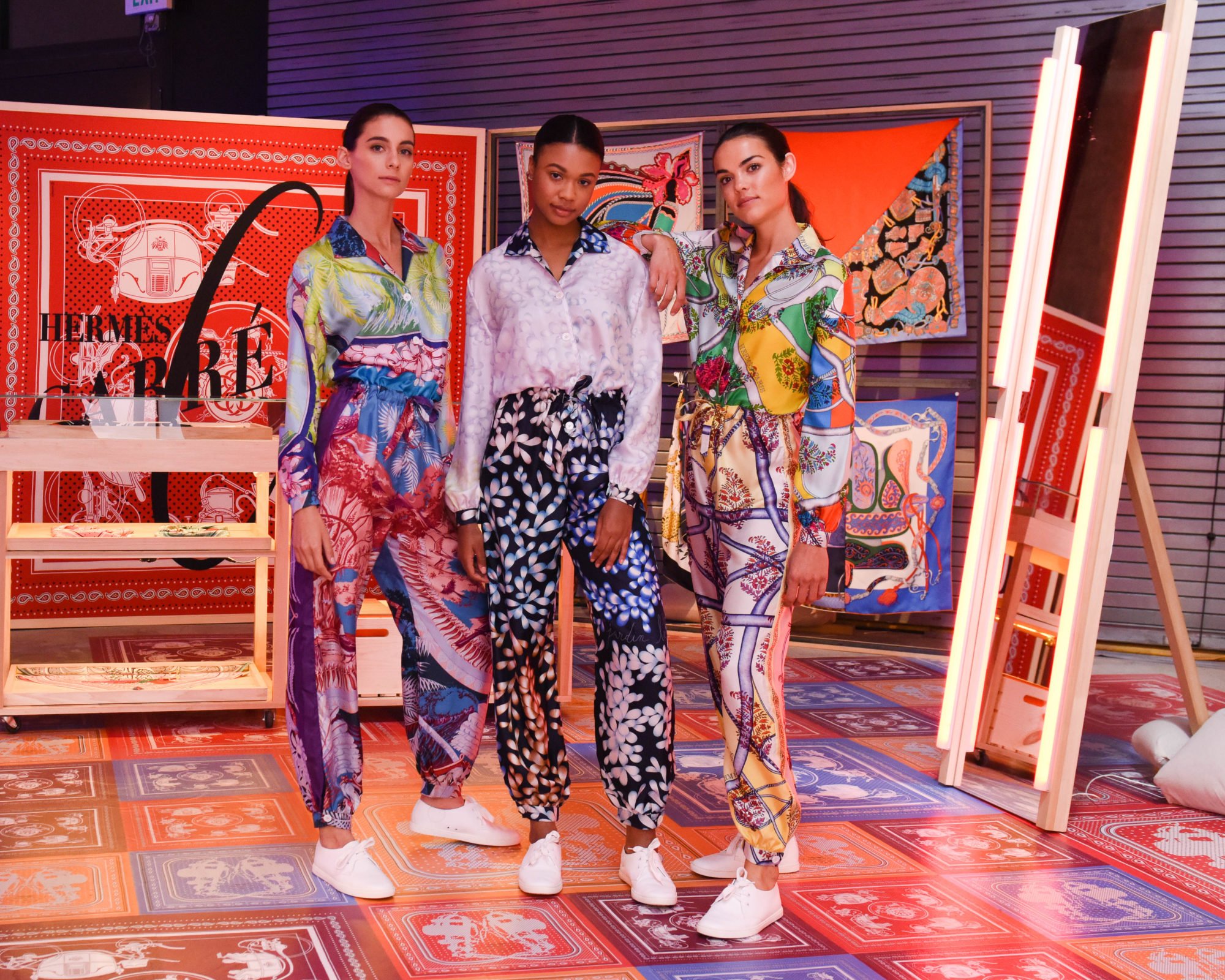
If you’re heading down Sunset Boulevard in Hollywood this month, you’ll probably catch a glimpse of a large wallscape with five curious square images. Each of the images is an artwork, but they aren’t meant for the gallery wall—these pieces are each unique works destined for the silky surface of an Hermès Carré scarf.
This eye-catching public art installation, up through December 3, is the ongoing offshoot of the Carré Club, a pop-up experience that just took place in West Hollywood, where each of the artists who decorated the walls—Cyrille Diatkine, Edouard Baribeaud, Virginie Jamin, Alice Shirley, and the duo Octave Marsal and Théo de Gueltzl—performed artist activations in a festive setting that included live bands, DJs, a soundproof “Carré-oke” booth, and a shop to purchase exclusive scarves available only in LA.
Hermès Carré Club: Opening Night.
Hermès introduced its carré (which translates to “square”) scarf in 1937, and now presents four collections per year: two of heritage silk scarves, and two of scarves hand-stitched from a blend of silk from mulberry moth cocoons and high-quality cashmere. The Hermès Carré line is the best-selling luxury scarf in the world, and the brand uses its hand-picked artist collaborations to keep the silk-cashmere collections’ designs fresh.
Because the artisanal scarves are hand-stitched, the translation process from artwork to scarf is painstaking and extremely time-consuming. This could be seen in the work of Théo de Gueltzl and Octave Marsal, who have made intricate drawings and sculptures together for about five years, and who showed off their Rube Goldberg-esque “Drawing Machine” at the Carré Club—along with the lavish floral motif for their cashmere scarf that will be out next season.
Artist Theo de Guetzl at Hermès Carré Club: Opening Night.
“At first it was exceptional, because you wait a lot between the moment that you give the drawing to the final process,” says de Gueltzl of the two-year undertaking. “I think what’s amazing is the fact that someone is copying our hand to reproduce the drawings to make layers of colors to make the scarves. It’s insane for us to see how the drawing is exactly the same from the paper to the scarf.”
De Gueltzl described having his work appear on Hermès’s signature accessory as an honor for a French artist like himself. “I’ve lived in Paris my whole life,” de Gueltzl tells me. “I did fashion school and art school. We all knew the scarves.”
The Drawing Machine.
Nearby was London-based artist Alice Shirley, whose work has been included in exhibitions all over London, and who developed her nature motifs while working closely with that city’s Natural History Museum on a project for the International Union for Conservation of Nature. Shirley has been working with Hermès since 2012, and has made 10 scarves for the company drawn from her lush natural landscapes—but, unlike de Gueltzl and Marsal, she didn’t know much about Hermès’s rich history when the brand approached her.
“I was a bit clueless when I went in for my interview,” she admits. “I knew a little bit about the company, but in a very superficial way. It was fascinating to meet this incredible company and to meet the creative team, who are delightful. It’s a collaborative process with a lot of creative freedom.”
Hermès Carré Club: Opening Night.
Edouard Baribeaud, a French-German artist who has had solo exhibitions in Paris, Toulouse, Berlin, and Mumbai, was also on hand at the Carré Club to display his next scarf, a fanciful depiction of the play within the third act of Shakespeare’s A Midsummer Night’s Dream.
“My work is inspired by etching, and I like to make drawings with watercolor and ink,” says Baribeaud. “But the interesting part of the collaboration for me is that my works are mostly shown in gallery spaces in a frame, and when you do a scarf, it’s another logic. It’s a nice idea that artwork could be folded—it has to work unfolded, and it has to work folded. That’s why the corners are very important.”
For her part, the French artist Virginie Jamin—who has created over two dozen Hermès scarves in the 14 years she’s been working with the company—chose to decorate her scarf with several riding whips positioned in a satisfying loop-de-loop, harkening back to the company’s history as an equestrian-gear manufacturer.
Hermès Carré Club: Opening Night.
“Those are coming from the private Hermès collection,” she says about the whips, some of which had horse-head handles. “This is important, because they have a real story. I can feel the vibration, and I tried to draw them and make them alive on the paper.”
From those early horse-riding days in the 1830s, Hermès has been a name that is synonymous with luxury. The brand’s Birkin bags, for instance, are so coveted that Christie’s recently auctioned one in Hong Kong for approximately $377,000, making it the most expensive handbag in the world. Artist George Condo, who created the album cover for Kanye West’s A Beautiful Dark Twisted Fantasy, famously painted nudes on one of Kim Kardashian’s bags in 2013.
Hermès Carré Club: Opening Night.
Hermès, for its part, is a company long dedicated to artist collaborations, having worked with nearly 50 contemporary artists from all over the world. Some have become famous.
For instance, one of Hermès’s scarf designers, Kermit Oliver, received a great deal of attention when an article titled “Portrait of the Artist as a Postman” appeared in Texas Monthly in 2012. Describing the life of the only American-born Hermès designer, the article profiled Oliver, at 69, living in Waco, Texas. He had a lengthy artistic career, including a 2005 retrospective at the Museum of Fine Arts, Houston, but had decided not to support his family through his painting, opting instead to sort mail at the local Waco post office for decades.
Hermès Carré Club: Opening Night.
The Carré Club debuted in New York in September, before moving on to Toronto and Singapore in October, and finally reaching Los Angeles and Milan for November.